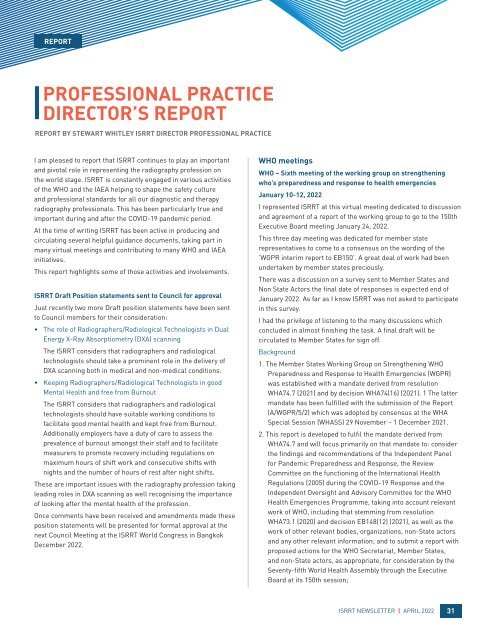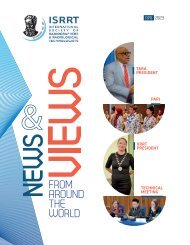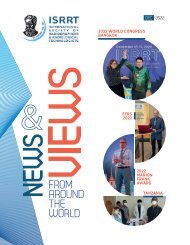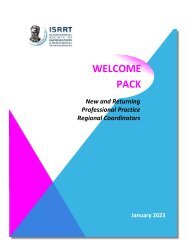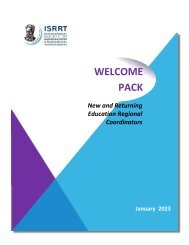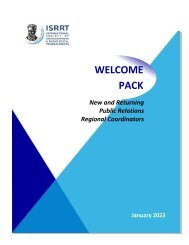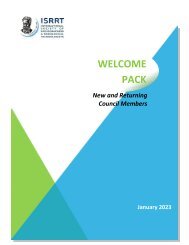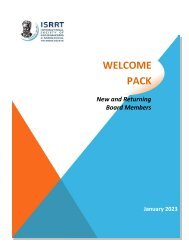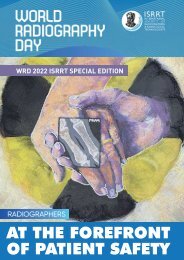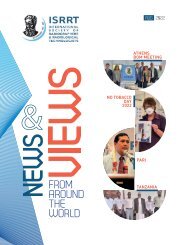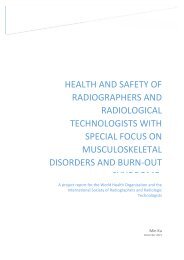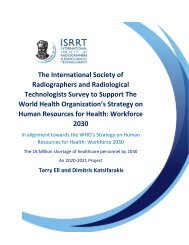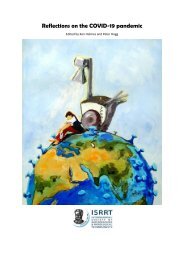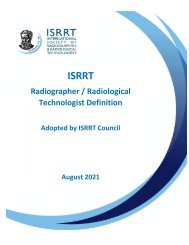N_V_April_2022_WEB_LR
You also want an ePaper? Increase the reach of your titles
YUMPU automatically turns print PDFs into web optimized ePapers that Google loves.
REPORT<br />
PROFESSIONAL PRACTICE<br />
DIRECTOR’S REPORT<br />
REPORT BY STEWART WHITLEY ISRRT DIRECTOR PROFESSIONAL PRACTICE<br />
I am pleased to report that ISRRT continues to play an important<br />
and pivotal role in representing the radiography profession on<br />
the world stage. ISRRT is constantly engaged in various activities<br />
of the WHO and the IAEA helping to shape the safety culture<br />
and professional standards for all our diagnostic and therapy<br />
radiography professionals. This has been particularly true and<br />
important during and after the COVID-19 pandemic period.<br />
At the time of writing ISRRT has been active in producing and<br />
circulating several helpful guidance documents, taking part in<br />
many virtual meetings and contributing to many WHO and IAEA<br />
initiatives.<br />
This report highlights some of those activities and involvements.<br />
ISRRT Draft Position statements sent to Council for approval<br />
Just recently two more Draft position statements have been sent<br />
to Council members for their consideration:<br />
• The role of Radiographers/Radiological Technologists in Dual<br />
Energy X-Ray Absorptiometry (DXA) scanning<br />
The ISRRT considers that radiographers and radiological<br />
technologists should take a prominent role in the delivery of<br />
DXA scanning both in medical and non-medical conditions.<br />
• Keeping Radiographers/Radiological Technologists in good<br />
Mental Health and free from Burnout<br />
The ISRRT considers that radiographers and radiological<br />
technologists should have suitable working conditions to<br />
facilitate good mental health and kept free from Burnout.<br />
Additionally employers have a duty of care to assess the<br />
prevalence of burnout amongst their staff and to facilitate<br />
measurers to promote recovery including regulations on<br />
maximum hours of shift work and consecutive shifts with<br />
nights and the number of hours of rest after night shifts.<br />
These are important issues with the radiography profession taking<br />
leading roles in DXA scanning as well recognising the importance<br />
of looking after the mental health of the profession.<br />
Once comments have been received and amendments made these<br />
position statements will be presented for formal approval at the<br />
next Council Meeting at the ISRRT World Congress in Bangkok<br />
December <strong>2022</strong>.<br />
WHO meetings<br />
WHO – Sixth meeting of the working group on strengthening<br />
who’s preparedness and response to health emergencies<br />
January 10-12, <strong>2022</strong><br />
I represented ISRRT at this virtual meeting dedicated to discussion<br />
and agreement of a report of the working group to go to the 150th<br />
Executive Board meeting January 24, <strong>2022</strong>.<br />
This three day meeting was dedicated for member state<br />
representatives to come to a consensus on the wording of the<br />
‘WGPR interim report to EB150’. A great deal of work had been<br />
undertaken by member states preciously.<br />
There was a discussion on a survey sent to Member States and<br />
Non State Actors the final date of responses is expected end of<br />
January <strong>2022</strong>. As far as I know ISRRT was not asked to participate<br />
in this survey.<br />
I had the privilege of listening to the many discussions which<br />
concluded in almost finishing the task. A final draft will be<br />
circulated to Member States for sign off.<br />
Background<br />
1. The Member States Working Group on Strengthening WHO<br />
Preparedness and Response to Health Emergencies (WGPR)<br />
was established with a mandate derived from resolution<br />
WHA74.7 (2021) and by decision WHA74(16) (2021). 1 The latter<br />
mandate has been fulfilled with the submission of the Report<br />
(A/WGPR/5/2) which was adopted by consensus at the WHA<br />
Special Session (WHASS) 29 November – 1 December 2021.<br />
2. This report is developed to fulfil the mandate derived from<br />
WHA74.7 and will focus primarily on that mandate to: consider<br />
the findings and recommendations of the Independent Panel<br />
for Pandemic Preparedness and Response, the Review<br />
Committee on the functioning of the International Health<br />
Regulations (2005) during the COVID-19 Response and the<br />
Independent Oversight and Advisory Committee for the WHO<br />
Health Emergencies Programme, taking into account relevant<br />
work of WHO, including that stemming from resolution<br />
WHA73.1 (2020) and decision EB148(12) (2021), as well as the<br />
work of other relevant bodies, organizations, non-State actors<br />
and any other relevant information; and to submit a report with<br />
proposed actions for the WHO Secretariat, Member States,<br />
and non-State actors, as appropriate, for consideration by the<br />
Seventy-fifth World Health Assembly through the Executive<br />
Board at its 150th session;<br />
ISRRT NEWSLETTER | APRIL <strong>2022</strong><br />
31


